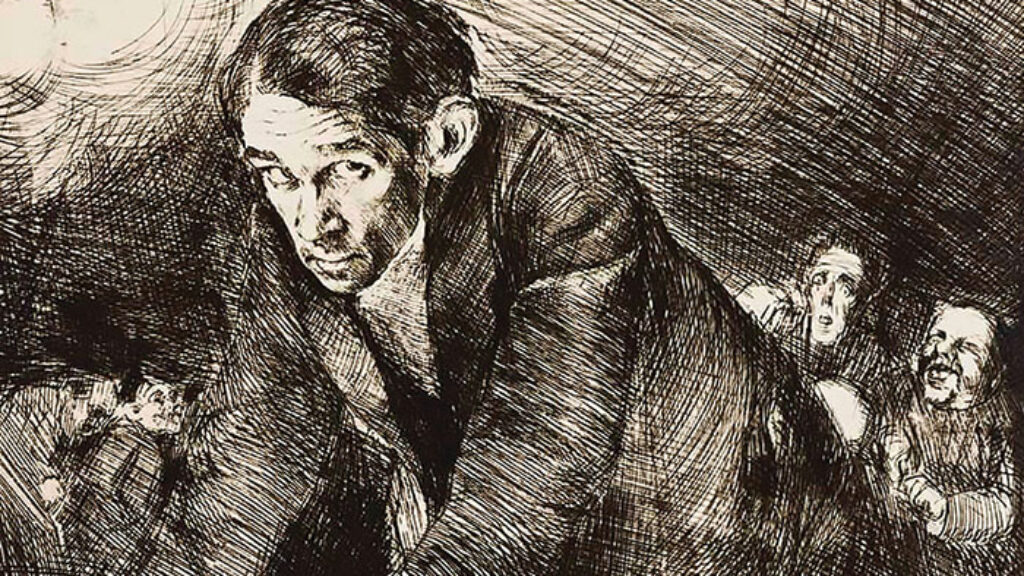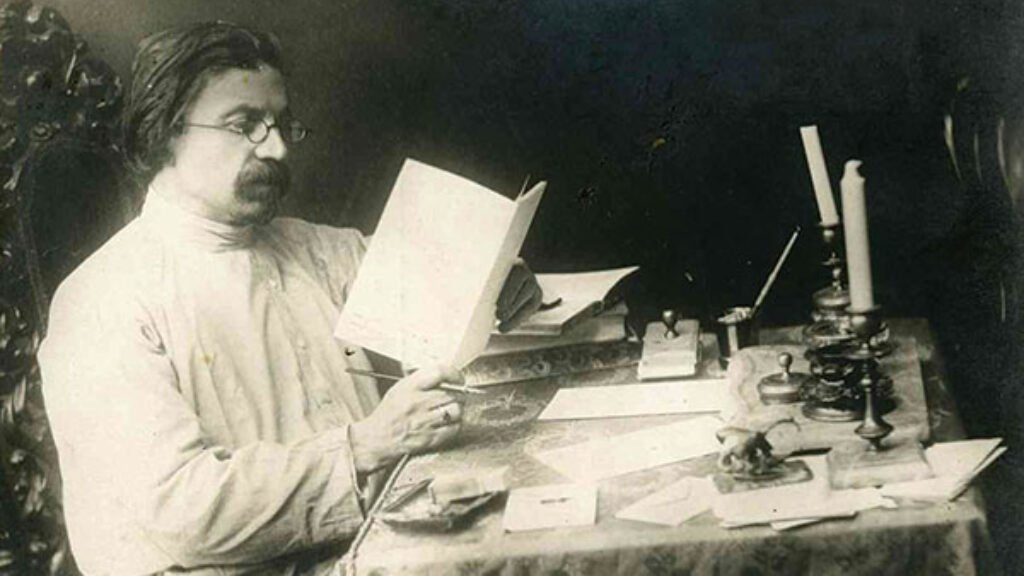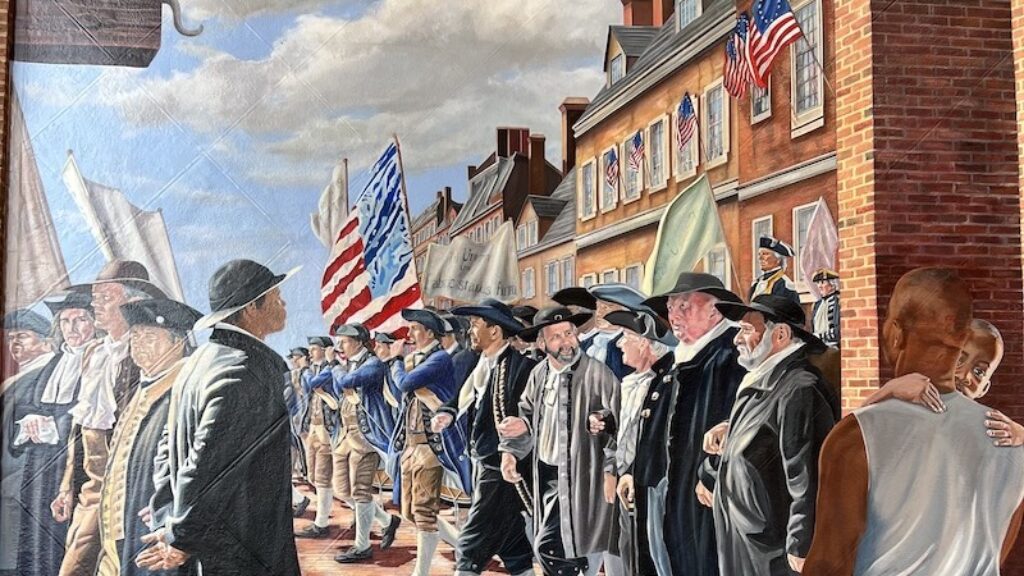Coming with a Lampoon
Howard Jacobson’s latest novel really got to me. I have been reading Jacobson with pleasure since his 1983 debut novel Coming from Behind and was happily surprised when he was awarded the 2010 Man Booker Prize for The Finkler Question, although in my opinion he ought also to have won it earlier for his darker novel Kalooki Nights. Jacobson is a world master of the art of disturbing comedy and each new work of his advances the genre—this one by a giant step.
J, or more precisely J, begins with a challenge, first to typesetters and then to readers, to crack the code of the double lines that cross the eponymous letter. Kevern “Coco” Cohen’s father would always “put two fingers across his mouth, like a tramp sucking on a cigarette butt . . . to stifle the letter j before it left his lips.” Kevern follows his father’s custom, which might have been taken over from his father. But if this is a family sport, it is not much fun for the son who would have liked to understand this habit of erasure. As a reader who sees the potential jew in every jewel, I was certain I grasped what Kevern doesn’t, but my anxiety then focused on the whys and wherefores of striking or muzzling that portentous consonant.

This novel is situated in the aftermath of “WHAT HAPPENED,” a fictional time at about the same chronological remove as we are now from the Shoah, whose horrors have been written about, commemorated, and mourned by a people schooled in such matters since Jerusalem’s destruction at the hands of the Babylonians. However, unlike the events of the Shoah, WHAT HAPPENED has been deliberately and systematically repressed.
In stark contrast to Jews who transmitted their heritage from generation to generation, always focused on their eventual recovery of Zion, the residents of Jacobson’s allegorical territory inherit a frightful history they refuse to confront. Determined to create a “harmonious society,” they try to erase the murderous past for perpetrators, bystanders, and victims alike through strategies of silencing and pacification. They look for a final solution to the J question by trying to expunge all memory of the evil that was done as a means of stamping out both the evil and those destined to become its victims. One is not permitted to speak of what happened except by adding “if it happened,” which attempts to suppress reality itself. Nor may one teach a J about his ancestor Js, as a means of ensuring that it will never happen again. Heirlooms and memorabilia are proscribed. Everyone in this fictional land assumes a recognizably Jewish family name to eradicate the kind of distinctions that presumably led to what happened—if it happened. That the given names of all the characters are British or Celtic in origin situates the action somewhere in the fictional England of all Jacobson’s fiction, with the adopted Jewish patronyms ensuring a permanently irritating reminder of what is being denied.
In “breaking” the J code and making explicit what the novel never does, I do not in the least lighten its nocturnal atmosphere which is telegraphed in the opening sentence:
Mornings weren’t good for either of them.
They are Ailinn Solomons and Kevern Cohen, whose love story reveals the condition of their world. We learn that they are damaged in opposite ways, Ailinn by the absence of any known family, having been picked out “like an orange” from an orphanage, while Kevern is haunted by a father and mother who beleaguer him from beyond the grave. He continues to hear his dead mother’s voice as a cry for help, pronouncing his name “Key-vern,” which minus the last consonant is the Hebrew-Yiddish word keyver, for grave. The complementarity of this man and woman would appear to make them a perfect fit; others recognize their affinity before they feel it on their own. Both are homespun artists, he a wood turner and she a designer of paper flowers, and they express their love through art without words. He makes her a lovespoon “in which the two of them could be recognized, entwined, inseparable, carved from a single piece of wood,” in return for which she makes him “a pair of exquisitely comical purple pansies, a paper likeness of his face in one, hers in another,” and arranges them so that “they stared at each other unremittingly.” Alas, mere words are the medium through which society—and the novel—must function.
When they meet, Ailinn is painfully literal, unable to recognize let alone grasp the implication of Kevern’s wit. He instructs her in humor. (So as not to alarm her by overuse of that freighted J, he avoids the word joking.) She tells him that she feels constantly—eternally—in flight from some pursuer, like Herman Melville’s white whale from Captain Ahab. Around such intimate revelations they develop lively repartee:
“I was going to ask . . . [he says] whether Ahab is a generalized idea for you or you actually picture him coming at you with his lampoon.”
“Lampoon?”
“Slip of the tongue. You’ve been making me nervous. Harpoon.”
She stared at him. “You call that a slip?”
“Why, what would you call it?”
“A searchlight into your soul.”
She has figured out how his mind works. “You set it a problem and when it could come up with no answer, it came up with a joke.” She also realizes that his obsessions about being invaded are those of a paranoid who has real enemies. In fact, they are both the objects of pursuit, though by pursuers with opposite intentions—Kevern’s aim to complete the deeds of the unmentionable past, while Ailinn’s aim to undo them.
The forces shadowing Kevern in the seaside village of Port Reuben have been likened by other reviewers to East Germany’s STASI or the Big Brother network of George Orwell’s 1984, but they appear to be spying less for a state than for a state of mind. Edward Everett Phineas Zermansky is a teacher of “Benign Visual Arts” who starts out rather liking Kevern, but later rages with mistrust of him and holds him responsible when his wife walks out on their marriage. Equally unhinged and overzealous is Detective Inspector Gutkind, himself the eventual victim of a murder he doesn’t see coming. It seems that everyone in this small village is reporting on the residents known as “aphids”—those marked as alien not by their genealogical records (which are taboo as is everything relating to the past) but by their distinctive behavior. Neither Kevern’s gentler nature that earns him his clownish nickname nor his being a native of Port Reuben make him any less suspect in the eyes of his goyish beholders.
Ailinn falls under the no less intense scrutiny of Esme Nussbaum, a researcher employed by Ofnow, “the non-statutory monitor of the Public Mood.” In the course of studying the effects of the social experiment, Esme discovers “the continuance of low- and medium-level violence in those very areas of the country where its reduction, if not its cessation, was most to have been expected, given the money and energy expended on uprooting it.” The summary of Esme’s report as delivered to her superior enunciates its dystopian premise: “The past exists in order that we forget it.” Ofnow requires that the citizenry continually disremember and apologize. Esme, however, concludes that unless one learns from the past . . . but she is cut off before she can complete the thought. Her defiance of Ofnow almost gets her killed in the kind of staged accident whose intentionality cannot be proven. As she slowly recovers the use of her broken body she resolves to learn what did happen. When she discovers Ailinn and deduces her origins, she becomes the orphan’s unsolicited guardian and reacquaints her with the identity her ward had not known was hers to claim.
Thus the aphid lovers are of equal importance to two opposing constituencies: those who need to reconstruct them to recover their prelapsarian world and those who need to destroy them as a means of inhibiting their own need to keep destroying them. Much as we are invited to enjoy the emerging love of this smart and well-matched couple, we come to realize that the forces pressing in on them allow them no private getaway or escape. On one such attempted excursion to the Necropolis that his parents warned him against visiting—at this point the text jarringly interjects “Who wanted to holiday in the environs of Babi Yar?”—Kevern unwittingly learns about the enormity of violence and betrayal that preceded his birth, including in the personal behavior of his “first-generation” parents. There are secrets of all kinds in private and public life, but historical erasure makes it hard to separate genuinely evil deeds from fairly innocent assignations, such as Kevern’s mother apparently had in an unconsummated affair with a local butcher. Weighing Kevern down is the cumulative weight of WHAT HAPPENED, which his “harmonious society” and his survivor parents forcibly suppressed. The only solution he can see is to end their line.
Because Esme persuades Ailinn to perpetuate her species, Kevern is betrayed by the woman he loves. Just as the biblical Tamar waylays Judah, the female duo of Esme and Ailinn conspire to seduce Kevern for the sake of a tribe he has no wish to perpetuate. Whether this constitutes a happy or unhappy ending may depend on whether one believes that Jews or anti-Jews will win out.
When I came to the final page of this book, I was reminded of something I had heard 30 years ago while on a visit to Paris. We were staying with a Frenchwoman who had met her Jewish husband-to-be when they were both in the anti-fascist resistance. The Jew and his mother were the only ones of their family to survive the war, and so our Christian hostess insisted on raising their children as Jews as an extension of their “resistance.” Their boys were circumcised and when their eldest son decided to circumcise his newborn son, she called her mother-in-law to share the good news. But the Jewish great-grandmother insisted they call it off, saying: “Ça suffit! It’s enough!”
So what’s this about Jacobson’s “disturbing comedy”? My ham-fisted (forgive me) exposition has conveyed too little of the book’s wit. “This place needs cheering up,” Ailinn says when she and Kevern visit a cathedral, and indeed, she picks up the habit of joking as though she were genetically predisposed to it. So she is. Yet it must be said that all the cheer that she and her author bring into their world is not enough to brighten it. The book is a satire of all the unfunny people that surround the novel’s J-crossed lovers, anti-Semites ranging from Wagner and his enthusiasts to local blokes who can’t help baiting Js because that is what they are predisposed to do. This society’s homogenizing attempts at self-improvement cannot eliminate its malice. Smaller forms of corruption seep back with a vengeance: Kissing, for which Jacobson uses the current British slang verb “snogging,” is brutal and ugly; marriages are vengeful and ugly; murders are coarse and almost random. If I were English, I would shudder as Jacobson approached with his lampoon.
And what of the Js? When Ailinn begins to read about her forebears, the dog-eared books tell her:
They demanded too much. They set too high a standard. A second writer understood their defining characteristic as a near irresponsible love of the material world, and it was this that had landed them in hot water. Offered the spirit, they chose matter. Offered emotion, they chose reason. This one said they were deeply pious; that one found them profoundly sacrilegious. They were devoted to charity, yet they amassed wealth regardless of how they came by it. When they weren’t consumed by self-regard they suffered a bruising sense of worthlessness. They saw the universe as a reflection of the God that loved them above all people, but moved through it like strangers.
She recognizes herself in none of this except, slightly, the alienation. Given the depth of her deracination, her only function in the future world of the novel is as fodder for her antagonists.
J feels less like a book by a writer who went looking for a subject than the outcry of a subject that was in need of its writer. Europeans composed no Book of Lamentations to record the destruction (self-destruction) of their civilization, leaving it mostly to Jews to document their losses as though theirs was the reckoning that mattered. But nothing had HAPPENED that was not made to happen and Jews were not the agents of that happening, although the temptation to blame them retroactively remains as great as it ever was. The tens of thousands of real and fictionalized survivor testimonies contribute little to our understanding of the forces that generated the destruction of European Jewry. This novel does so by shining a searchlight into the soul of Europe; it functions as the fictional equivalent of Esme’s report to Ofnow. The record of now’s adaptation to then through forcibly harmonizing people and indiscriminate apologetics without arduous self-scrutiny shows how the conditions of violence are reconstituted.
Of course, the British are a special case. Their habits of obfuscation are different from continental malice, and the atmosphere of this book is that of an island nation, a people that wants to be decent if only it could figure out how. As a genre, the dystopian novel aims at warning against the worst that can happen. I pray that Jacobson’s may have some effect, though, as another J once noted, prophets are usually without honor or impact in their own country.
Comments
You must log in to comment Log In
Suggested Reading

And the Heart Is Forever Broken
Amid the ferment of interwar Poland, two opposite motions guided Jews who followed the sometimes blinding torches that lit the way toward modern culture. The first surged outward. The second traveled inward.

Moshkeleh the Thief
“The holiday is also sweet and dear because poor and dejected Jews toil hard, alas, and struggle, and just barely, in the nick of time, amid great trouble, angst and tribulations, bring in the holy holiday. Now, finally, they can rest and relax for eight days in a row.” A new translation of Sholem Aleichem by Curt Leviant.
Comes the Comer
The New American Haggadah boasts a high-profile cast of contributors—Jonathan Safran Foer, Nathan Englander, Nathaniel Deutsch, Jeffrey Goldberg, Rebecca Newberger Goldstein, and Lemony Snicket. But it also features a series of unfortunate translations and commentaries.

When Freedom Began to Ring
How the land of opportunity became the opportune land for Jews to thrive.
dougaltabef
As soon as I started reading your review of J, I put it down to read the novel first (having read both Finkler's Question and Kalooki Nights).
In those two books, there is scant awareness by Jacobson's characters of Judaism or the Jewish People; in J this state of affairs reaches its apogee as the name of the religion or the People cannot even be uttered, let alone recalled.
I found myself reading from the perspective of an oleh. Jacobson's world is bleak; the larger world is brutish, unmoored, something less than human. The Js, those to whom IT HAPPENED, IF IT HAPPENED are merely reflections of those to whom they are not.
It is a world of no self-realization, as evidenced by the comical idea that everyone is apologizing all the time, and there is a top down driven way of forgetting and forgiving that involves giving everyone a Jewish sounding last name.
Frankly, as bleak and contrary to my nature as it was, Kevern's (channeling Jacobson, I suspect) decision not to participate in the renewal of the Js just so they could be annihilated again, makes some sense.
This to me, meaning that the state of a People whose self awareness is increasingly a function of being a reflection of those who they are not, of being a Condition unto an Affliction, is probably not worth sustaining.
The answer lies of course neither in a renewal that merely revitalizes the reflective character of the People, nor not in refusing to give the others the victory of another inevitable round of annihilation, but of true self and national renewal, which of course is the Zionist project.
Jacobson is sardonically funny, internally consistent, and at the end of the day, the frog in increasingly hot water that he allegorizes.
That might be the way he wants it, but to me it is clarion call about being otherwise.